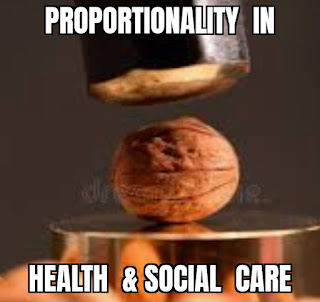Proportionality in Health & Social Care
In a lot of my advocacy work, I and the people that I work with often get told that the authorities have to be careful and ensure proportionality in distributing budget funds in health and social care. This is obviously a positive step, however practitioners also need to consider the individual circumstances in each case, often referring to the Equalities legislation. There has been a number of recent cases via human rights, judicial reviews and even from the local government ombudsman reminding authorities of the needs for this consideration.
However, this is not the point I want to make with this blog. I want to specifically discuss the matters of over checking on users of personal budget holders. At times, I have concerns that the authorities doing such checks might be looking at potential breeches of human rights legislation and the right to private life.
This specifically relates to surveillance on people's private lives. Bear with me, some people might think that I am exaggerating. Public authorities by law and various pieces of legislation allow the right to carry out checks for the purposes of ensuring say auditing or assessments. These are fine. No problem here, in surveillance terms this is overt (i.e.. people are aware of this). As they are told like CCTV. This is allowed and part of the system.
The principle in law under Human rights is that ‘you should not use a sledge hammer to crack a nut’. This principle is trying to ensure a public body does not over step its responsibilities when carrying out checks. Case law from Europe where a post master who had miscalculated stamp usage by a small amount which resulted in the secret service, of the country he lived in, being used to do actual electronic surveillance on the subject, Clearly a bit over the top.
However, in normal circumstances, if the enquiries start going deeper it too could be deemed covert surveillance, and thus potentially an infringement of a Human Right to interference from a public body on person's private life. I refer to an instance where someone say puts in a receipt for treatments through their personal budgets. The assessor subsequently phones the treatment centre and starts asking specific questions about the person to check potential non-existent financial irregularities (as in a recent case) without informing the person. Or even in the instance of prepayment cards, where people are not necessarily told that the authorities has access to these records and can and will examine them as they choose to without informing the user.
I am not saying that there will not be occasions where this level of investigation might be needed, however I am yet to have found or heard of a case. If an assessor or their manager feels this may be necessary, then there is a process that allows for this via the Regulations of Investigatory Powers Act and assessors should before contemplating such at least run it past their legal team. Not doing so can have very serious legal ramifications for the person and the authority. The thing is here any deeper investigations that go beyond normal checks may be deemed surveillance. Espesialy if the person is unaware of these.
I often contemplate whether some of the processes employed by Health and Social care seem a bit over the top. Proportionality wise, in the absence of fraud or misappropriation, many of the checks and balances put in place often seem excessive. Considering the need to save more money in these services reducing these could help with such matters. For those who believe it is part of the job remember that even the statutory guidance suggests reducing such for people who have been running their budgets for some time. This was even further highlighted in a local government ombudsman case suggesting such in January 2020.



Comments
Post a Comment